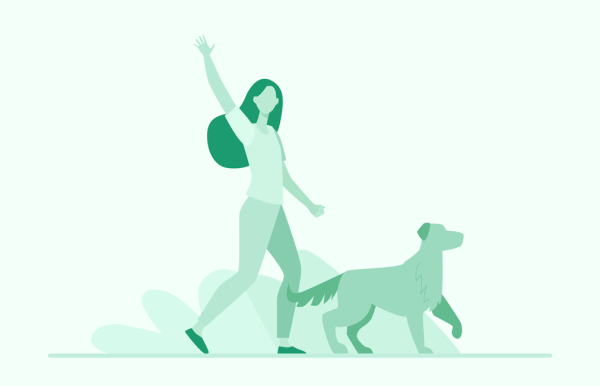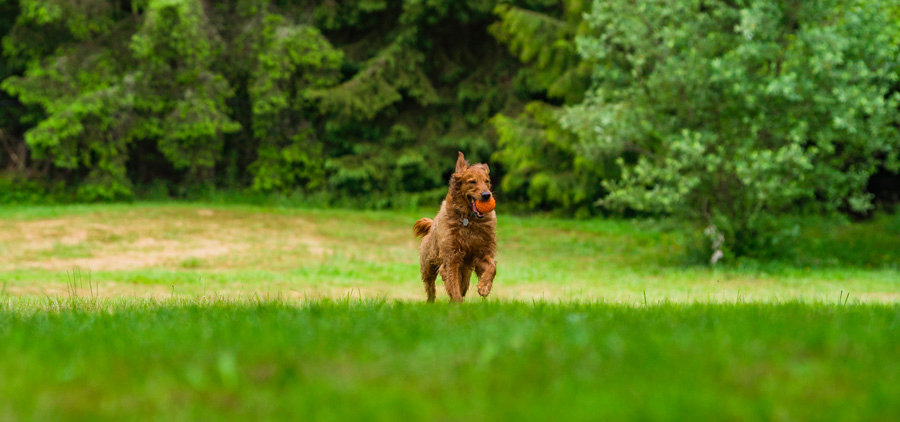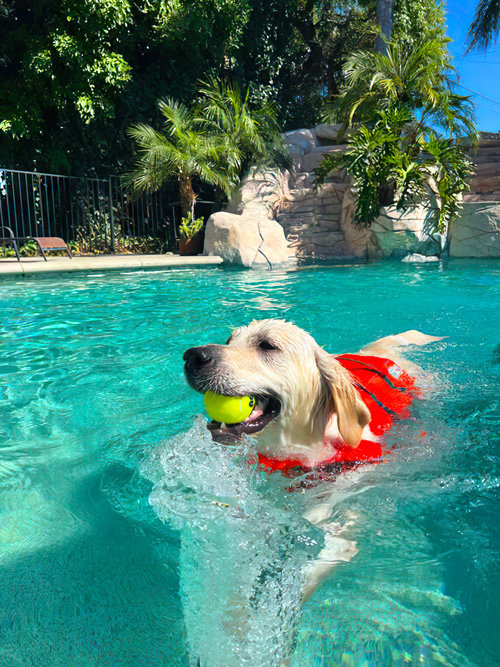How Long Does it Take to Potty Train a Puppy?

You want your puppy to be potty trained as quickly as possible. We get it! Cleaning up accidents is no fun. And you'll be able to take your pup on more adventures, like to indoor pet-friendly stores and restaurant patios, if you're able to trust that they won't use the bathroom where they shouldn't.
Here's how to know if your potty training timeline is reasonable — and some tips to make the house training process as easy as possible on you and your puppy.
How long does potty training a puppy usually take?
It can take anywhere from a few weeks to a few months for a puppy to be fully potty trained. Most dogs get the hang of going to the bathroom outside between four to six months of age.
What factors influence potty training time?
The time it takes to potty train your puppy can vary widely depending on breed, age, socialization, and the consistency of your training.
Your puppy's physical size
Smaller dog breeds may have smaller bladders and may need to go outside more frequently. This can affect the speed of your puppy's potty training! Larger puppies, on the other hand, will have similarly larger bladders.
(Some pet parents opt to use puppy pads or even litter boxes to help with logistics during the initial potty training time with small dogs — you can read more on that below and in this longer article.)
Your puppy's age
Younger puppies have less bladder control and may need more frequent bathroom breaks than older puppies or adolescents.
A common rule of thumb: Puppies can hold their bladders an hour for every month of age, give or take one depending on other circumstances (they'll have to go sooner if they've recently drank a bunch of water, for example, but can last longer if they're sleeping).
So:
- A two-month-old puppy (eight weeks of age) can hold their bladder for around 1-3 hours.
- A three-month-old puppy can hold it for around 2-4 hours.
- A four-month-old-puppy can last 3-5 hours.
- A five-month-old puppy can go 4-6 hours.
- A six-month-old puppy can last 5-7 hours.
- Adolescents older than seven months can usually hold their bladders as long as fully grown dogs can, between 6-8 hours and sometimes more overnight. Keep in mind you should always give your dog a regular chance to use the bathroom even if they can go longer between breaks. 4-6 hours is a nice interval. (Think about how uncomfortable it is for you to be asked to hold it!)
How you keep a consistent schedule
Consistency is everything in house training. Regularly taking your puppy outside to the same designated area — and using consistent cues and positive reinforcement — can go a long way.
Your training techniques
Clear communication, positive reinforcement, and interrupting undesirable eliminations promptly play a significant role in the speed of potty training. It can also make a world of difference to maintain one potty spot!
We cover more of the house training process in the next section.
Your puppy's early socialization
Puppies that have been well-socialized — especially exposed to different environments and surfaces during their early weeks — may adapt more quickly to using the bathroom in a range of situations. The big outside world can be distracting for a young dog during the potty training process!
Potty training basics
We know the process of house training can be daunting. Here's how to get on your way to potty training success!
Get your puppy on a regular feeding schedule
If your puppy eats on a regular schedule, it will be easier to predict when they need to use the bathroom!
- Feed your puppy at the same time each day. Keep track of when they eat and when they use the bathroom so you can start to notice their individual patterns. Your dog should consistently process food in a predictable period of time. (A bonus of this schedule: You’ll be able to notice any appetite or waste changes right away to get in touch with your vet.)
- Pay attention to any extra treats you give them during the day that might increase their need to relieve themselves. If possible, try to give treats at regular times.
- Give free access to water whenever possible, but be aware of any times they drink more than usual (like after playing or finishing a chew).
Take your puppy outside at regular potty time intervals (and increase the time between bathroom breaks slowly)
It’s important to start small during the potty training process.
Take your dog outside more frequently than you think you need to at first — and gradually increase the intervals between their potty breaks only when they’ve shown they can consistently handle the previous amount of time.
To start, it’s a good idea to take your puppy outside on a regular schedule every 1-2 hours as well as shortly after they:
- Wake up in the morning or from a nap
- Finish a meal
- Play or engage in another activity
Encourage your puppy to potty in the same area to create a predictable pattern
Dogs are inclined to use the bathroom in the same spot they’ve gone before. You can use this to your advantage outside! Try walking your puppy in a small circle in the same corner of your yard to encourage a healthy habit of eliminating there.
Use positive reinforcement when your dog gets it right
Don’t allow your puppy to play or run around before they’ve gone potty — but as soon as they pee or poop outside, praise and reward them! You can use small training treats, physical affection, or a favorite toy to celebrate their job well done.
(Note: Wait until after your dog has finished eliminating so you don’t interrupt them in the act. You want to make sure they have time to fully empty their bladder, which can take more than 30 seconds as they age, before offering a tasty treat or fun game.)
Keep your puppy in a crate or pen when you’re unable to supervise
Dogs usually don't like to use the bathroom where they sleep or eat. By confining your pup to a smaller space (like a comfortable appropriately sized kennel, wire pen, or room with a baby gate), you can take advantage of this natural instinct to reduce the odds of accidents while you're away.
Is your puppy uncomfortable with confinement in a crate, or have you just never used one before? You can read more about kennel training an adult dog in this article!
You can also consider setting up designated potty pads in your dog’s environment if you have to leave them alone longer than you think they can hold their bladder. A couple variations of this are paper training and litter box training.
 fluffy pomeranian puppy and urine puddle, view from above
fluffy pomeranian puppy and urine puddle, view from above
At what age should you be concerned if your puppy still isn't potty trained?
As mentioned above, potty training timelines can vary widely among individual dogs. There isn't a one-size-fits-all answer!
That said: There are general guidelines that can help you assess whether your puppy might need additional attention (or if there could be an underlying issue).
- Age: Most puppies can start learning basic potty training skills as early as eight weeks old. By the time a puppy is six months old, they should have made significant progress in potty training. If your puppy is often having accidents indoors after this age, it may be a cause for concern.
- Consistency and training: If you have been consistently following a training routine and your puppy still hasn't shown improvement after a few months, you may want to evaluate the effectiveness of your training methods. Are your bathroom break intervals fair to your puppy's bladder development? Are you rewarding your puppy for going outside? Are you supervising them closely?
- Health issues: Sometimes health issues can contribute to potty training difficulties. If your puppy is having frequent accidents, consult with a veterinarian to rule out any underlying problems like urinary tract infections.
- Behavioral issues: In some cases, potty training difficulties may be related to anxiety, fear, or other behavioral problems that hinder the learning process. A professional dog trainer or behaviorist can help you identify and address these concerns!
- Life changes: Major life changes, such as moving to a new home or the addition of a new family member or pet, can disrupt a puppy's routine and contribute to potty training regression. Patience and consistency during these times are crucial.
If you are concerned about your puppy's potty training progress, consult with your veterinarian and consider seeking the assistance of a professional dog trainer. They can evaluate the specific circumstances, provide guidance, and help tailor a training plan that suits both your puppy's needs and your lifestyle.
Related reading
Trainer Review of this Article
There is so much misinformation out there, we want to make sure we only provide the highest quality information to our community. This is the trainer that reviewed this article:
Lindy Langum
Founder - K9 Fun Club Staff Trainer - Summit Assistance Dogs Certified in Canine Studies (CSS), NW School of Canine Studies
Most recent articles

The Best Dog Toys for Aggressive Chewers (Facts + Infographic)

Are German Shepherds an aggressive dog breed?

Best Dog Rescue and Shelter Contest

How to Deal With Food Aggression in Dogs (Facts + Infographic)

Introduction to Dog Nosework

Why Dogs Cry and How to Help Your Pup’s Whining
Related articles

The Best Dog Toys for Aggressive Chewers (Facts + Infographic)

Are German Shepherds an aggressive dog breed?

Best Dog Rescue and Shelter Contest
Top dog guides per area
Dog training guides

How to Deal With Food Aggression in Dogs (Facts + Infographic)
Does your dog ever growl when you walk by their food dish? Maybe they get possessive of treats, carrying them far away and giving you side-eye when you start to approach — or snarling at your other pets or children if they get too close.

Comprehensive Guide to Scent Training for Dogs (Facts + Infographic)
As almost every dog owner is aware, the nose of a dog is an amazing thing. Just as they can pick up sounds we can’t hear, their sense of smell and ability to pick up scents is well beyond ours. In fact, dogs have 40 times the number of olfactory receptors as humans.

How Much Does it Cost to Train a Service Dog?
All Sniffspot articles are reviewed by certified trainers for quality, please see bottom of article for details *

What is and How to Handle Potty Training Regression
* All Sniffspot articles are reviewed by certified trainers for quality, please see bottom of article for details *

Coprophagia: Why Does Your Dog Eat Poop?
Ah, poop. We humans think it’s disgusting… but many of our dogs seem to love the stuff. If you’re wondering why your canine companion tries to eat feces (either his own or that of other animals) you’re not alone!
Dog enrichment guides

The Best Dog Water Parks in the United States
Do you have a water-loving dog looking to burn some energy? There are countless dog parks to visit throughout our country — but some of them become far too hot in the midday sun to be safe for your pets to play. That’s why we’ve put together a list of some of the best dog water parks throughout the United States! At these locations, your pup can frolic, splash, and swim to their heart’s content.

Best Toys for Herding Dogs
* All Sniffspot articles are reviewed by certified trainers for quality, please see bottom of article for details *

The Best Dog Toys for Aggressive Chewers (Facts + Infographic)
Does your dog destroy every toy you give them? Is your house littered with remnants of fabric and stuffing of all different sizes? Are you tired of investing in “indestructible” toys only for your pup to still dismantle (or worse, get bored of) them in just a few days?

Dog Exercise Calculator: How Much Exercise Does Your Dog Need?
You’ve been told that your dog needs regular exercise. There’s a reason “walking the dog” is a classic daily activity: Frequent excursions give your pup a chance to stretch their legs, experience the world, maintain a healthy weight, and spend time with you! Consistent physical activity will also improve their strength, muscle tone, coordination, and mental ability over time.

Complete Guide To Herding With Dogs
* All Sniffspot articles are reviewed by certified trainers for quality, please see bottom of article for details *
Dog reactivity guides

Rottweiler Aggression: Signs, Causes, and How to Handle It
Many dog breeds have gotten a bad reputation over the years for being dangerous. Rottweilers are among them — as a large working breed, they’re often thought of as aggressive.

Dog Reactivity Chart: Understand and Fix Dog Reactivity
Your dog is reactive. They’ll see another dog, person, or other stimulus in the environment (like a car or bike) while out on a walk and suddenly go crazy at the end of their leash. The barking, lunging, and growling feels embarrassing for you — and it’s clear that your pup isn’t having a great time either.

How to Socialize Your Reactive Dog
* All Sniffspot articles are reviewed by certified trainers for quality, please see bottom of article for details *

Definitive Guide: What is Dog Reactivity?
Do you have a reactive dog or suspect you may have one? You’re not alone!

How to Deal With Food Aggression in Dogs (Facts + Infographic)
Does your dog ever growl when you walk by their food dish? Maybe they get possessive of treats, carrying them far away and giving you side-eye when you start to approach — or snarling at your other pets or children if they get too close.
Sniffspot community guides

The State of Public Dog Parks Across the United States
From 2009 to 2020, there was a 40 percent increase in the development of public dog parks. Designated spots for canine exercise have become commonplace in every major city in North America — many pet owners won’t even consider renting an apartment that doesn’t have its own fenced-in pet area for their canine companions.

How This Family is Affording Their Dream Property Through Renting it Hourly to Dogs
Thousand Oaks, California has been a safe haven for Sniffspot host, Jen, since childhood. Having grown up in busy Santa Barbara, Jen, an introvert from an early age, would seek out solitude and serenity away from tourists attractions and droves of people visiting from elsewhere. “My grandparents own 60 acres about a 30 minute drive from here, and I grew up spending every summer and every holiday visiting them on the ranch,” Jen explained. “In Santa Barbara, we wouldn't go to the beach on the weekend because that's where everybody was, so you'd find places off the beaten path where the tourists weren't. For me, the ranch was just my happy place.”

Host Tips: Ellen K. What Makes Sniffspot Successful for Me
Ellen is the host of Country Pasture Getaway, one of Sniffspot's most popular sniff spots. She has taken the time to write up the lessons she has learned about how to be a great sniff spot host.

How this Oregon Farmer is Making a Business From Renting Her Land to Dogs
Just 20 minutes outside of the busy city of Portland, Oregon, and settled right on the banks of the Columbia River, you’ll find what countless visitors have flocked to the area in search of – mountain views, crisp, clean air, and running water for miles. What you might not expect to find, however, is a hidden oasis designed just for dogs and their people, owned and operated by a farming couple and enjoyed by visitors on two legs, and four.

Host Tips: Fran T. Providing Great Guest Service at our Spot
Fran is the host of Ranch Setting, one of Sniffspot's most popular spots. She has taken the time to write up the lessons she has learned about how to be a great Sniffspot host.
Top dog trainers in the US

The Best Dog Trainers in the United States of 2023
Welcome to the United States Sniffspot top dog trainer list for 2023. This is a list of the top dog trainers in the United States based on votes from the Sniffspot community and the general public. Over 55,000 votes were used in compiling this list. We have only included the top trainers with sufficient votes and the trainers are ordered in terms of the number of votes received. Trainers that tied are ranked in reverse alphabetical order based on first name. All dog trainers on this list are positive reinforcement only, as defined by no force, fear, intimidation, or aversive methods used.

The Best Dog Trainers in New Jersey of 2023
Welcome to the New Jersey Sniffspot top dog trainer list for 2023. This is a list of the top dog trainers in New Jersey based on votes from the Sniffspot community and the general public. Over 55,000 votes were used in compiling this list. We have only included the top trainers with sufficient votes and the trainers are ordered in terms of the number of votes received. Trainers that tied are ranked in reverse alphabetical order based on first name. All dog trainers on this list are positive reinforcement only, as defined by no force, fear, intimidation, or aversive methods used. To learn more about our dog trainer contest, feel free to view the dog trainer contest post.

The Best Dog Trainers in Michigan of 2023
Welcome to the Michigan Sniffspot top dog trainer list for 2023. This is a list of the top dog trainers in Michigan based on votes from the Sniffspot community and the general public. Over 55,000 votes were used in compiling this list. We have only included the top trainers with sufficient votes and the trainers are ordered in terms of the number of votes received. Trainers that tied are ranked in reverse alphabetical order based on first name. All dog trainers on this list are positive reinforcement only, as defined by no force, fear, intimidation, or aversive methods used. To learn more about our dog trainer contest, feel free to view the dog trainer contest post.

The Best Dog Trainers in Washington of 2023
Welcome to the Washington Sniffspot top dog trainer list for 2023. This is a list of the top dog trainers in Washington based on votes from the Sniffspot community and the general public. Over 55,000 votes were used in compiling this list. We have only included the top trainers with sufficient votes and the trainers are ordered in terms of the number of votes received. Trainers that tied are ranked in reverse alphabetical order based on first name. All dog trainers on this list are positive reinforcement only, as defined by no force, fear, intimidation, or aversive methods used. To learn more about our dog trainer contest, feel free to view the dog trainer contest post.

The Best Dog Trainers in Florida of 2023
Welcome to the Florida Sniffspot top dog trainer list for 2023. This is a list of the top dog trainers in Florida based on votes from the Sniffspot community and the general public. Over 55,000 votes were used in compiling this list. We have only included the top trainers with sufficient votes and the trainers are ordered in terms of the number of votes received. Trainers that tied are ranked in reverse alphabetical order based on first name. All dog trainers on this list are positive reinforcement only, as defined by no force, fear, intimidation, or aversive methods used. To learn more about our dog trainer contest, feel free to view the dog trainer contest post.
City dog parks guides

The Best Indoor Dog Parks in the United States
Looking for a space to play with your dog no matter what the weather’s like outside? Look no further than our list of the best indoor dog parks in the United States! These climate-controlled spaces are growing in popularity as pet ownership increases throughout the country. As a bonus, many of them also offer dog training, boarding, grooming, or daycare services on the premises.

The Best Off-Leash Dog Parks in the United States
Looking for the perfect place to play with your dog? We’ve got you covered! It’s hard to narrow down, but we’ve put together some of the best off-leash dog parks throughout the country so you can plan your next adventure — along with a checklist of what to bring, what to know beforehand, and some frequently asked questions.

The Best Las Vegas, Nevada Dog Parks
Looking for the perfect place to play with your dog in Las Vegas? We’ve got you covered! Take a look at the best local dog parks and plan for your next adventure in Sin City.

The Best United States Dog Parks
Looking for the perfect place to play with your dog? We’ve got you covered! It’s hard to narrow down, but we’ve put together some of the best dog parks throughout the country so you can plan your next adventure. Here’s what the United States has to offer to its more than 90 million canine companions.

The Best Portland, Oregon Dog Parks
Looking for the perfect place to play with your dog in Portland? We’ve got you covered! Take a look at the best local dog parks and plan for your next adventure in the City of Roses.

















